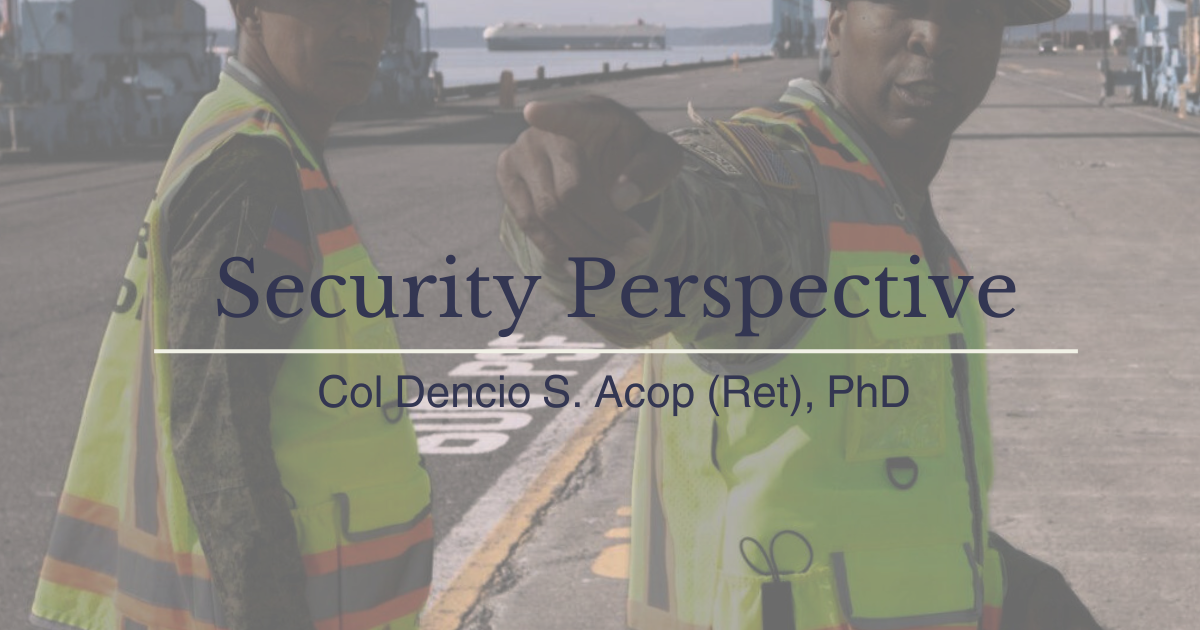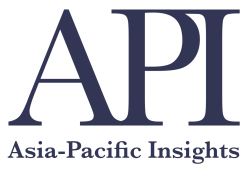Global Risk Updates as of Year Ending 2024

By Col Dencio S. Acop (Ret), PhD, CPP | Date 11-08-2024
PERTH, AUSTRALIA — The setting sun as seen from Boston Bay, Haneda, or Perth seems so serene amidst the dying light. It has a calming effect following a hectic day. The peace of it all is stabilizing. It provides that never-ending hope tomorrow brings. Ignorance is bliss. It is also a blessing because underneath it all is the burden of those who carry the weight of the uncertain future.
While there is relative prosperity and peace in the world, it also continues to be beset by growing insecurities in both the natural and artificial orders. As if the worsening impacts of climate change are not enough to destabilize the global order, “war and conflict, polarized politics, (and) a continuing cost-of-living crisis” (Global Risks Report 2024) are proving intractable in these times. The growing world insecurity scenario is credibly captured by the World Economic Forum’s 2024 Report, and perhaps the latest added insecurity is fueled by the world’s anticipation of the newly-elected US leader’s plans of action which could include the withdrawal of global initiatives made by his predecessor.
First, the duo of climate and conflict seems irreversible and is expected to worsen over the years. The most recent findings on this duo are authoritative as they come from the responses of around “1,500 global experts from academia, business, government, the international community, and civil society” who participated in the World Economic Forum’s Global Risks Perception Survey.
The findings are significant in terms of risk assessment because “more than half (54%) anticipate a significant degree of instability and a moderate risk of global catastrophes”. They also point out that in about 10 years, “by 2034, almost two-thirds (63%) predict a stormy or turbulent world order”. Also quite critical is the finding that “the threat from misinformation and disinformation is identified as the most severe short-term threat”.
The report adds that “the growing concern about misinformation and disinformation is in large part driven by the potential for AI, in the hands of bad actors, to flood global information systems with false narratives”. This same concern was emphasized in the 2024 GSX Conference I recently attended. That conference was the annual gathering of global security practitioners.
The potential consequences of misinformation and disinformation around the globe, as assessed by the Forum Report, are even more dire because they “could result in civil unrest” and “could also drive government-driven censorship, domestic propaganda, and controls on the free flow of information”. Meanwhile, on climate change, the report expresses concern that “nations remain unprepared for the ‘triggering of long-term, potentially irreversible and self-perpetuating changes to select planetary systems’ (which) could be passed at or before 1.5C of global warming, currently anticipated to be reached by the early 2030s”.
It is, in fact, encouraging that the World Economic Forum meeting annually in Davos, Switzerland, is taking much-needed initiatives to rebuild global trust amidst the “diminishing trust, political polarization, and a volatile geopolitical landscape”. It is also further encouraging to note from the report that “solutions could emerge as a result of more localized cooperation on the part of nations, corporations, and even individual citizens”.
Second, the new American leader’s anticipated withdrawal of US engagement in world affairs could throw back any advances made in the critical areas of climate and conflict. True to his domestic followers, it would appear that the newly-elected leader is set to unleash part two of his momentarily interrupted 8-year reign. But, unless some unprecedented development occurs, it appears Trump is merely on his way to continue what he began and finish what he started. And, judging from hindsight, it may seem well for a dominant domestic population but it certainly won’t for the rest of the world that looks to the US for leadership.
Let’s take a look at these possibilities one by one. First, on climate change, with Trump’s expected withdrawal from the Paris accord a second time, the world’s biggest polluters like China, “already irked by US ‘green trade barriers’ on electric vehicles, batteries, and solar panels”, according to Reuters (2024), now couldn’t care less about saving the planet even if it too will suffer the consequences. Next, on defense, while the Biden administration was able to reset US-China relations to avoid war over Taiwan in the Taiwan Strait or the Philippines in the South China Sea, war could erupt faster than earlier assessed if the Republican Commander-in-Chief opts to push Xi and the Chinese Communist Party like he did the first time around.
If China doesn’t push the button yet, it would not be because of Trump but because it needs more time to develop its nuclear arsenal. But, the story over in Europe is different. With Trump’s likely decision to ignore NATO as “Putin is his friend”, the US would be encouraging rogue leaders like Putin while alienating its long-time NATO western allies.
Moreover, in the Middle East, hardliner Netanyahu could find political support in Trump towards conflict escalation with Hamas, Hezbollah, and even the Arab states particularly Iran. The only moderating factor in such a scenario would be his “friend”, Putin. While Trump’s domestic political base may view his unilateral foreign policy as “making America great again”, the rest of the world’s realpolitik may not be in total agreement. This brings us to our final point of discussion.
And third, there will be the expected victimizations and counteractions from nations and peoples impacted by US withdrawal from the world stage, including Americans. For instance, and just to name a few, the first one is fentanyl. The previous administration successfully inked an agreement enabling rare joint investigations with the Chinese to combat drug trafficking, including fentanyl abuse, which is a major cause of death in the US. As a result, Chinese authorities tightened “controls on three chemicals essential for making fentanyl”, as reported by Reuters. Fentanyl, “100 times more potent than morphine and 50 times more potent than heroin” (DEA 2020), causes some 70,000 drug-overdose deaths annually in the US (NIDA 2024).
Second, some progress in the form of dialogues made by the outgoing administration on economic and financial issues may be halted again under a Trump presidency. Reuters (2024) reported that, for Beijing, such is a legitimate concern. The US has been trying to add tariffs on Chinese products, restrict Chinese investments, and impose sanctions on Russia-related issues.
Third, illegal immigrants on American soil will expect to be prosecuted and deported. It’s happened before and it will happen again. Fourth, while the Republican blueprint tries to adopt a more inward-looking domestic and foreign policy, such a strategy has both advantages and disadvantages depending on which department one is looking out from. The desired solution is one that should balance both, as an imbalance could cause more problems than it solves.
Fifth, even with split-second technology, a defense-in-depth will still protect American interests better than an isolationist policy ever could. Japan, China, foreign policy experts, military strategists, and enemies of state know this fact from history. In his desire to streamline America like a business empire, Trump should understand that he will need to strike an effective balance between spreading America too thinly abroad and protecting domestic interests in the age of post-globalization. While he will need to keep his enemies close, he must also not make new enemies of former allies. Or, worse, make new enemies of old enemies.
The sun must keep rising from the east. The hope it brings is enough to keep the world turning. The peace it captures — stabilizing. May this lasting hope be the impact of the World Economic Forum’s 2024 Report, and not just the forlorn conclusion of its warning. May the duo of climate and conflict be reversible and not worsen over the years.
May the new American leader’s anticipated actions in world affairs advance the critical areas of climate and conflict for the general good of humanity. And may the impact of America’s actions make America great again as the leader of the free but just world.
Tags: Security
